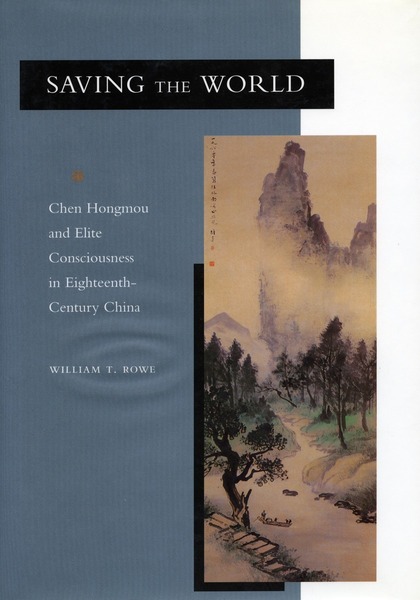Newly released
This book is new and will be uploaded as soon as it becomes available to us and if we secure the necessary publishing rights.

Saving the World: Chen Hongmou and Elite Consciousness in Eighteenth-Century China Book PDF
(0)
Author:
William T. RoweNumber Of Reads:
252
Language:
English
Category:
HistorySection:
Pages:
614
Quality:
good
Views:
1462
Quate
Review
Save
Share
New
Book Description
Chen Hongmou (1696-1771) was arguably the most influential Chinese official of the eighteenth century and unquestionably its most celebrated field administrator. He served as governor-general, governor, or in lesser provincial-level posts in more than a dozen provinces, achieving after his death cult status as a “model official.” In this magisterial study, the author draws on Chen’s life and career to answer a range of questions: What did mid-Qing bureaucrats think they were doing? How did they conceive the universe and their society, what did they see as their potential to “save the world,” and what would the world, properly saved, be like? The answers to these questions are important not only because vast numbers of people were subject to these officials’ governance, but because the verdict of their successors was that they did their jobs remarkably well and should be emulated. Three persistent tensions in elite consciousness focus the author’s investigation. First, the elite adhered to the fundamentalist moral dictates of Song neo-Confucian orthodoxy at the same time that a new valuation of pragmatic, technocratic prowess abhorrent to the moral tradition emerged. Second, two contradictory views on the use of “statecraft” to achieve an ordered world were in play―one that favored the expansive use of the state apparatus, and one that emphasized indigenous local elites and communities. Finally, the subordination of human beings to the service of hierarchical social groupings contended with a growing appreciation of the dignity, moral worth, and productive potential of the individual. The author uses a holistic approach, attempting, for example, to explore how notions regarding gender roles and funerary ritual related to Qing economic thought, how the encounter with other cultures on the expanding frontiers helped form ideas of “civilized” conduct at home, and how an official’s negotiation of the complex Qing bureaucracy affected his approach to social policy. The author also considers how attitudes formed during the prosperous and highly dynamic eighteenth century conditioned China’s responses to the crises it confronted in the centuries to follow.
William T. Rowe
William Roy is a social historian of modern China, in very broad terms "social" and "modern", whose work has centered on cultural, intellectual, economic and political history as well.
His first two books dealt with the nineteenth-century history of a major inland Chinese trading city; The second received an impressive award from the Urban History Association, and made him engage in the debate on issues of "civil society" and "the public sphere". He also wrote books on the consciousness of the ruling elite of the Qing dynasty in the relatively prosperous eighteenth century, and on the patterns of agricultural violence in a war-torn Chinese province habitually over the course of seven centuries.
Recently he wrote a general exegetical history of the Qing dynasty, entitled The Last Empire of China.
Read More
Book Currently Unavailable
This book is currently unavailable for publication. We obtained it under a Creative Commons license, but the author or publisher has not granted permission to publish it.
Rate Now
5 Stars
4 Stars
3 Stars
2 Stars
1 Stars
Saving the World: Chen Hongmou and Elite Consciousness in Eighteenth-Century China Quotes
Top Rated
Latest
Quate
Be the first to leave a quote and earn 10 points
instead of 3
Comments
Be the first to leave a comment and earn 5 points
instead of 3